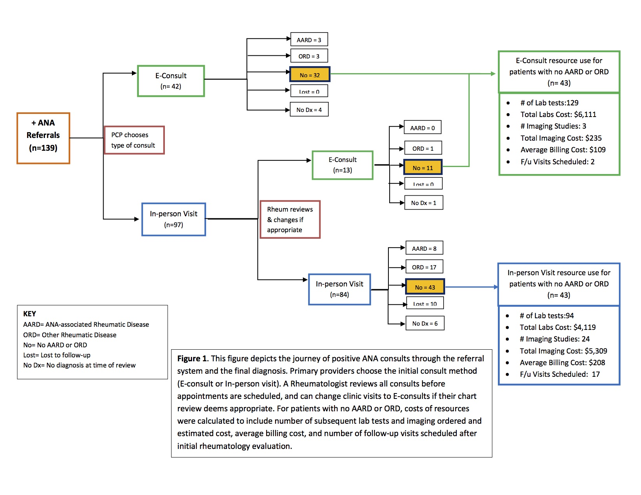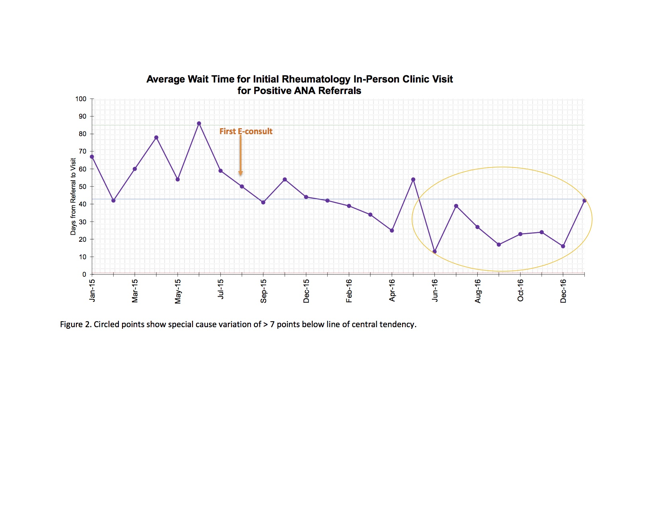Session Information
Session Type: ACR Poster Session A
Session Time: 9:00AM-11:00AM
Background/Purpose: Referrals to rheumatology for positive ANA in the absence of clinical signs and symptoms is a common practice, which may lead to unnecessary resource use and contribute to delays in patients seeing a rheumatologist. The electronic consult (E-consult) was developed for specialists to review a patient’s medical record and make recommendations without an in-person visit in an effort to improve access to timely care. The aims of this project are to assess how E-consults for positive ANA are being used in clinical practice, examine their impact on resource use, and evaluate if the introduction of E-consults improved wait times for in-person rheumatology visits.
Methods: Charts were reviewed for Veterans referred to the Houston VA outpatient rheumatology clinic from 1/2015-3/2017 with “positive ANA” as the reason for consult. Demographic data, referral information, relevant rheumatologic labs and imaging were recorded. Veterans’ final diagnoses were organized into the following categories: AARD (ANA-associated rheumatic disease), ORD (other rheumatic disease), no AARD or ORD, lost to follow-up or no definitive diagnosis at time of review. Lab costs for Veterans with no AARD or ORD were calculated using the cost to the Houston VA. The costs of consults were estimated using the 2017 Medicare National Fee Schedule. Imaging costs were estimated from the Healthcare Bluebook. An XmR control chart was created using average wait times for in-person clinic visits per month.
Results: A total of 139 Veterans had positive ANA outpatient consults. Figure 1 shows the number of patients with positive ANA consults and their final diagnosis category. 55/139 (40%) of Veterans received E-consults. 73% of patients with consults (86/139) did not have an AARD or ORD (n=43 E-consults, n=43 in-person visits). Of these, E-consults spent $1,992 more on lab tests, while clinic visits spent $5,074 more on imaging studies. Clinic visits were more likely to schedule follow-up visits and on average billed $99 more per visit. Figure 2 is a control chart showing special cause variation with >7 points below the line of central tendency (circled graph points), indicating that E-consults have made an impact on decreasing in-person visit wait times.
Conclusion: E-consults are an effective way to address positive ANA consults, which has helped decrease wait times for in-person rheumatology visits. E-consults did spend more on lab tests, but had less follow-up appointments and imaging use. Future studies should address patient satisfaction and PCP satisfaction with the E-consult process.
To cite this abstract in AMA style:
Patel V, Stewart D, Horstman M. The Impact of Electronic Consults (E-Consults) on Positive ANA Referrals in a Veteran Population [abstract]. Arthritis Rheumatol. 2017; 69 (suppl 10). https://acrabstracts.org/abstract/the-impact-of-electronic-consults-e-consults-on-positive-ana-referrals-in-a-veteran-population/. Accessed .« Back to 2017 ACR/ARHP Annual Meeting
ACR Meeting Abstracts - https://acrabstracts.org/abstract/the-impact-of-electronic-consults-e-consults-on-positive-ana-referrals-in-a-veteran-population/


